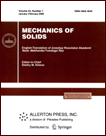 | | Mechanics of Solids
A Journal of Russian Academy of Sciences | | Founded
in January 1966
Issued 6 times a year
Print ISSN 0025-6544
Online ISSN 1934-7936 |
Archive of Issues
| Total articles in the database: | | 13427 |
| In Russian (Èçâ. ÐÀÍ. ÌÒÒ): | | 8178
|
| In English (Mech. Solids): | | 5249 |
|
| << Previous article | Volume 38, Issue 1 / 2003 | Next article >> |
| A. V. Sibiryakov, "Impulsive loading of thin-walled composite structural members," Mech. Solids. 38 (1), 139-145 (2003) |
| Year |
2003 |
Volume |
38 |
Number |
1 |
Pages |
139-145 |
| Title |
Impulsive loading of thin-walled composite structural members |
| Author(s) |
A. V. Sibiryakov (Moscow) |
| Abstract |
At the present time, requirements of practice draw considerable attention
to the dynamic strength of structures, in particular, to the response
of elastic systems to an external impulsive loading. The solution
of the corresponding problems enables one to evaluate the stress-strain
state of structures subjected to an impact loading. This is important
for the selection and rationalization of the load-bearing structure
of machines and technological equipment operating under intensive
dynamic disturbances.
The solution of this complex multifaceted problem requires improved
methods of strength analysis associated with the
computational schemes which would ensure more complete
and more comprehensive study of real processes subject to modeling.
It has been noted in numerous publications that the response of structural members
to impulsive disturbances has been studied insufficiently. As has been
mentioned in reviews devoted to the state of the art in the field
in question, this is especially the case for members having a complex
structure, which can be regarded, for example, as nonhomogeneous
plates and shells modeling structures from composite materials.
However, the problem turned out to be so complicated and multifaceted
that one can hardly speak of its complete solution.
Among the methods utilized to solve this problem, numerical methods
are highly widespread. Of the numerical methods, the most familiar
and commonly utilized technique is the finite elements. However,
this method requires special models of nonlinear media to be created
and rather sophisticated calculations to be performed taking into account
the appearance of a large number of waves. These calculations
are very cumbersome and highly difficult to implement.
For applications, the most important (and most difficult) is to study
the initial, transient stage of propagation of excitations inside
structural members. The available (rather scarce) experimental data indicate
that members of composite materials fail just at this stage and that
this failure is associated with delamination. (Sometimes, this
phenomenon is utilized also to separate damaged parts of monolithic
structures.)
Taking into account a wide class of structures undergoing impacts,
it is necessary also to point out the importance of studying
unsteady impulsive loading of structural elements and their
dynamic response.
Apparently, the ultimate aim of research in this field should
be the creation of a theory describing the behavior
of structural members under an unsteady loading.
This is the case primarily for thin-walled load-carrying members
such as plates and shells. However, the solution of this global
problem is still a long way off. |
| References |
| 1. | Composite Materials. A Handbook [in Russian],
Naukova Dumka, Kiev, 1985. |
| 2. | V. V. Bolotin and A. A. Grishko,
"Numerical simulation of fracture of laminated materials
subjected to an impact loading,"
Izv. AN. MTT [Mechanics of Solids], No. 3, pp. 151-160, 1992. |
| 3. | V. V. Vasil'ev, Mechanics of Structures from Composite
Materials [in Russian], Mashinostroenie, Moscow, 1988. |
| 4. | T. Y. Thomas, Plastic Flow and Fracture in Solids
[Russian translation], Mir, Moscow, 1964. |
|
| Received |
25 September 2002 |
| << Previous article | Volume 38, Issue 1 / 2003 | Next article >> |
|
 If you find a misprint on a webpage, please help us correct it promptly - just highlight and press Ctrl+Enter If you find a misprint on a webpage, please help us correct it promptly - just highlight and press Ctrl+Enter
|
|

 Russian
Russian  English
English